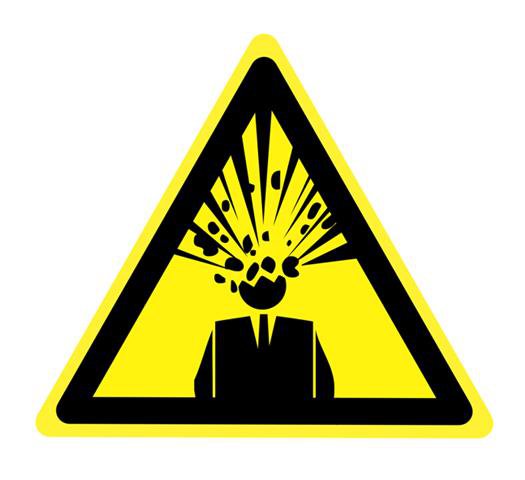- Joined
- Oct 23, 2013
- Messages
- 26,183
- Points
- 113
Exploding Head Syndrome


Exploding head syndrome is a type of . People with EHS hallucinate a sudden and alarmingly loud noise while they are falling asleep or when they are waking up.
Among sleep disorders, exploding head syndrome (EHS) is certainly in the running for most sensational name. Those who have it understand how frustrating it is, while those without it are often surprised to learn that the explosion refers to a sound within the head during sleep, rather than a physical explosion of the head itself.
EHS was first recorded in clinical literature in the , but unfortunately little research has been done since then to capture the prevalence of the disorder, its causes, and possible treatment options.
Below we’ll review what exploding head syndrome is exactly, and how it interferes with sleep. Then we’ll provide our best recommendations for getting a better night’s sleep with EHS.
What is exploding head syndrome?
Exploding head syndrome is a type of . Parasomnias are a category of sleep disorders that occur during the transitions between sleep and waking or between different stages of sleep. People with EHS hallucinate a sudden and alarmingly loud noise while they are falling asleep or when they are waking up.
EHS is not dangerous, but it can be unsettling at best or terrifying at worst. EHS interferes with the sleep of affected individuals on the day of an episode, but it can cause in the long run if they begin to fear sleep itself as a result.
Symptoms of exploding head syndrome
During an instance of exploding head syndrome, the sleeper experiences an auditory hallucination as they are falling asleep or waking up. Common reported noises include gunfire, cymbals, fireworks, shouting, explosions, doors slamming, thunder, or electrical static. The sound itself may be heard from one ear or both, and some patients report it coming from inside their head (hence the “exploding head” in the name). The sound itself will last a few seconds at most.
In addition to the sound, people may see flashes of bright light or feel an electrical sensation or shock traveling from their torso to their head. Feelings of anxiety, including increased heart rate and heart palpitations, often accompany the sound. As a result, sufferers have a tougher time falling back asleep due to their heightened arousal.
In fact, even though the disorder itself is and painless, the anxiety and fear of an episode occurring can create anxiety around going to sleep at all, contributing to and resulting .
Causes of exploding head syndrome
Researchers still do not know what causes exploding head syndrome. They’ve explored potential culprits, including issues in the inner ear, seizures in the temporal lobe, or bleeding in the brain.
However, the leading theory posits that EHS, much like , is caused by a glitch in the brainstem reticular formation. The reticular formation regulates your transitions between wakefulness and sleep, as well as your motor reflexes and muscle control.
During the transition between sleep and alertness, it’s common for people to experience hypnagogic jerks. That’s the scientific term for those involuntary spontaneous muscle spasms you sometimes experience while you’re falling or asleep or waking up. Researchers believe these jerks happen when there is a miscommunication among neurons in the reticular formation .
When you’re asleep, your brain puts your auditory and visual neurons to sleep, too. During , your brain also paralyzes your muscles to prevent you from physically acting out your dreams. Sleep paralysis and EHS may occur when there is a misfire during this process, with neurons in the brain waking up before muscles and other parts of the body. People with sleep paralysis may experience hypnagogic jerks along with hallucinations, dreams, exploding head syndrome symptoms like bright lights or loud sounds, or sensations of falling. Meanwhile, in the case of exploding head syndrome, the part of the brain that processes sound may while the are suppressed.
, the lead researcher on the 2015 Washington State University study of EHS, described it thus:
“[Consider] the brain to be a computer. You go through a series of steps when you’re shutting down your computer, and your brain does the same thing. As you go to sleep, your auditory and visual neurons are normally inhibited. What we think happens during EHS is that instead of shutting down, these neurons fire all at once. When they do, they create a perception of sound, which is why sufferers hear the loud noises.”
Risk factors for exploding head syndromeAlthough little understood, exploding head syndrome is not as rare as people think. Separate studies estimate between to of people experience EHS at least once in their lifetime.
Individuals with are twice as likely to experience EHS, and people with psychiatric disorders are than the general population to have EHS. Having high levels of emotional or physical stress are also associated with the disorder.
It’s generally been assumed that EHS is more common in women than in men,
Last edited:


